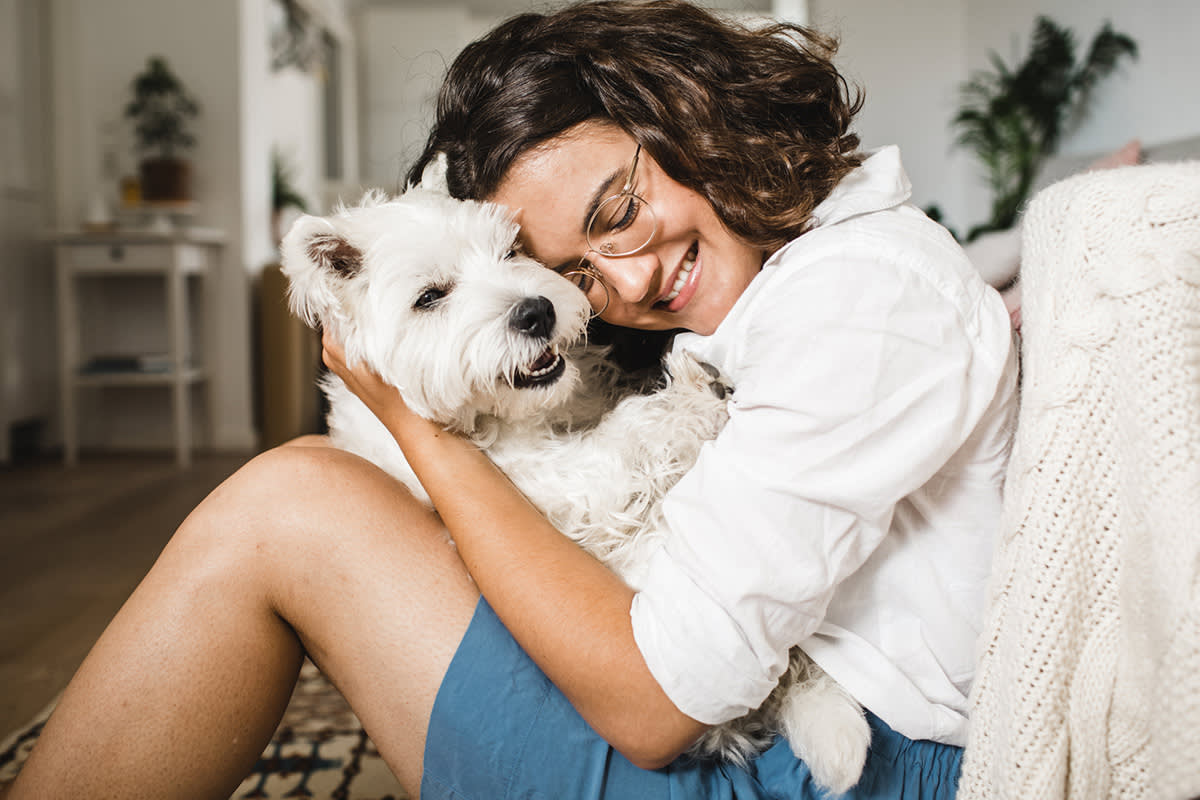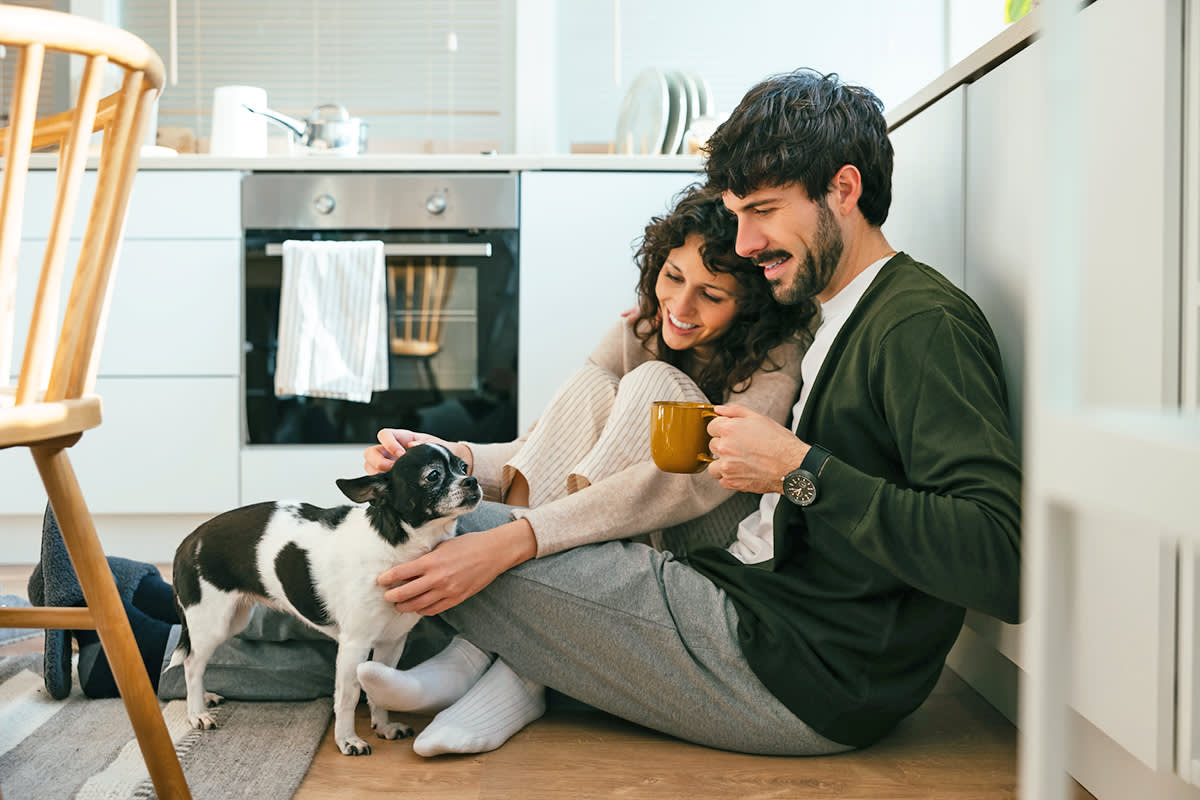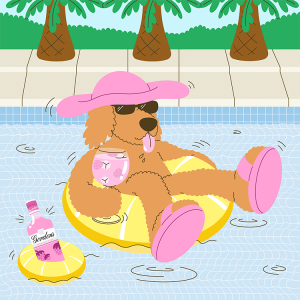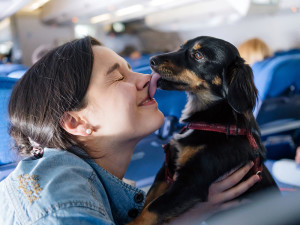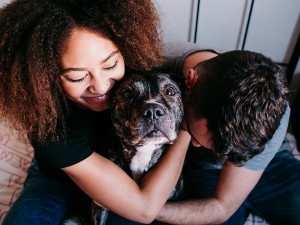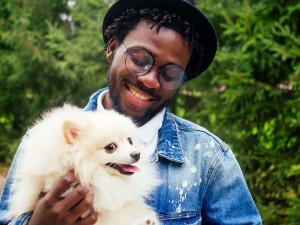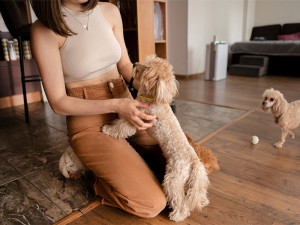Does Your Dog Know How Much You Love Them?
Lately, dog parents on TikTok seem to have one question on their minds.

Share Article
Whether it’s the pet parents of this sweet German Shepherd named Zeusopens in new tab, or this dog mom who jokes that her pup would trade her for a piece of cheeseopens in new tab, or this adorable Vizsla’s peopleopens in new tab who are very skeptical, everyone wants to know: Does my dog know how much I love them?
If the viral trend of Buddy the Elf on a green screen screamingopens in new tab, “I love you! I love you! I love you!” is any indication, we’re certainly doing a good job of trying to communicate our human feelings to our pups. But is the message getting across?
Do dogs understand the concept of love?
We get it: You believe in your heart of hearts that your dog understands how much you love them — it’s why we make TikToks about it and tell them 50 times a day. And there’s absolutely nothing anyone can say to convince you otherwise.
But, in the name of science, we talked to expert, and it turns out it’s not quite so simple.

A dog has the cognitive ability of a two-year-old, says Dr. Katherine Houpt,opens in new tab professor emeritus at the Cornell University College of Veterinary Medicine. That means they don’t have the mental capacity to understand how much you love them, as lovely as that would be (right up there with free health care and a lifetime supply of your pup’s favorite treats).
“I don’t think [a dog] is able any more than the two-year-old is to say, ‘This person loves me, and therefore I appreciate that she loves me,’” Houpt says. “I don’t think they go through that.”
If your heart just sunk, it’s understandable. But instead of getting down about it, reframe the way you think about your relationship so that it’s beneficial for your pup and their distinctly canine point of view.
“Your dog is not going to write you a poem,” Houpt says, with laugh. “He’ll wag his tail when he sees you. You can have a wonderful bond with your animal without demanding that the dog do something he is intellectually incapable of doing.”
Do dogs love us?
So, maybe dogs can’t determine how much we love them, but do dogs love us? It’s fair to say that they are probably big fans of humans: Studies have shown that oxytocin levels surgeopens in new tab for both dogs and humans when we’re hanging out or gazing into each others’ eyes.
As Alexandra Horowitz, a canine cognitive scientist and professor at Barnard College, wrote in November 2024 in Science Focus, “What is clear to anyone who observes dogs’ behavior is that dogs are hopelessly fond of usopens in new tab. We could call it ‘hypersociable’ or ‘socially preoccupied’; we could call it ‘excessively affectionate.’ Or we could call it loving.”
But — and there is a but — Horowitz also wrote that it’s difficult to recognize an “anthropomorphic concept” (like love) in “a species without the verbal capacity” to tell you what they’re feeling.
What’s wrong with anthropomorphizing?
Houpt says the very fact that many people use the phrase “pet parent” (she’s not a fan of it, though we at Kinship definitely are!), means that we do tend to anthropomorphize, or attribute human characteristics, to our relationships with our pets.
“The pet does look to you for comfort, for food, for warmth, for entertainment — you’ll throw the ball, you’ll take them for a walk. So, you’re certainly acting as a parent,” Houpt says, clarifying that she loves her own dog very much.
But how the dog perceives that is another story, she adds, and it can actually be harmful to believe your dog has the same understanding of love that you do. “People do that somewhat to the dog’s detriment,” she says. “‘Doesn’t the dog realize I love him? Why does he then destroy the house when I’m gone?’ Well, because you’re not there. He does love you when you’re gone. He’s upset.”
Obviously, if your partner or roommate shredded a pillow while you were away, you’d start to question things. But a dog’s mind doesn’t work the same way, and assuming it does could cause some pet parents to become upset with their best friend. However, your dog wasn’t trying to convey a lack of love for you. They’re just expressing their canine feelings (such as anxiety or boredom or fear) in the best way they know how.
“What I’m worried about is that people say, ‘How can the dog do that terrible thing when he knows how much I love him?’” Houpt explains.
Let’s say, for example, that your dog gets ahold of a turkey bone opens in new tab that they could choke on, and you need to take it away.
“You’re doing that for the dog’s best interest, which he does not understand any more than your two-year-old would understand if you say, ‘No, you can’t have … some of my Champagne, because it’s not good for you,’” Houpt says. “And the kid or the dog may love you a little less [in that moment], but it’s in their best interest.”
How does my dog show affection?
Before you start to think that you’re just a human food dispenser, get that notion out of your head, too. It’s hard, after all, not to see something like a viral reunion videoopens in new tab and not believe that dogs understand human love.
“I think it’s a little more than, ‘Here’s my food source,’” Houpt says. “‘[It’s more like], ‘There’s my packmate, the source of comfort, as well as food and entertainment,’ and so on. I think there’s nothing more heartwarming than if you stoop down and hold out your arms and your dog rushes into your arms, whatever his motivation is — it certainly feels good to the human.”
Being near you and following you are also signs that your dog is bonded to you, according to Houpt. I proudly pointed out to Houpt that my senior dog licks my nose every morning and that I interpret it as a very affectionate “hello.”
“Well, licking faces means, ‘Please vomit food for me,’” Houpt says. “Because that’s what the mother dog does to the puppy. The puppy licks the corner of her mouth, and then she regurgitates baby food.” Thankfully, not every lick is a vestigial, ancestral behavior, and most are “more or less affectionate,” Houpt adds.
How to tell your dog you love them
Even though your dog doesn’t understand the degree to which you’d be willing to sacrifice yourself for them in battle — or that you spent $30 on that seasonal sweater instead of buying the cheap $8 one — it doesn’t mean you should stop trying to build your bond.
One big cue that might help convey how much you love them — even though Houpt is adamant that they still won’t fully grasp the concept — is speaking to them in a “baby” voice. That high-pitched cadence is a way for dogs to know someone is approachable, she says. (It turns out cats like it, too).
“Using that baby talk, the dog appreciates it,” Houpt explains. “And yes, it would strengthen the bond, just as you know, giving her a bone, or taking her for a walk, and so on.”
How to show your dog you love them
So, sitting your dog down and explaining your undying loyalty is not going to work. But just like with humans, sometimes actions speak louder than words. Try to think of it like: If this activity makes my dog’s life better, they’ll be more content — and if they’re content, that’s what matters the most. It’s not like you need a plaque that says “Best Dog Mom Ever” signed by your pup (but you’d accept it — obviously).
As training company Fear Free Happy Homes opens in new tab puts it on their website, “a fulfilled dog is a happy dogopens in new tab.” And at the end of the day, your pup’s happiness is your priority — not how much they may or may not understand the depths of your devotion.
Some of the best things you can do to show your dog you love them are:
Two to three daily walks to explore scents and the world around them
Regular outings to the park, dog park, or a hiking trail
Play mentally stimulating games and puzzles with them at home. For more interactive games, think fetch, hide-and-seek with treats in moderation, or slow food dishes where your dog must “hunt” for food)
Positive-reinforcement training; your dog can learn fun tricks
Agility trials for very active dogs
Beds and other cozy spaces around the house to prioritize their comfort
Of course, a healthy diet and regular vet care will also make your pup feel loved — even if they experience that love in their own, very unique canine way.

Marti Trgovich
Marti Trgovich is a writer specializing in pets and wildlife. She has written about animals for National Geographic, The Washington Post, Newsweek, and other publications, and she spent nearly a decade as an editor at The Dodo. Her favorite animals are guinea pigs, sheep, and small, saucy senior dogs.
Related articles
Do Dogs Love Their Human Parents?
You can certainly feel the love.
![illustration of a dog in a pool with a pink hat and pink shoes]()
Anthropomorphizing Your Pets Can Actually Benefit Them—and You
If your friends make fun of you for treating your dog like a human being, send them this.
Why Does My Dog Lick Me? The Meaning Behind Dogs Licking Us
The sentiment is nice, but...
![Couple hugs their merle Boxer]()
How to Improve Your Relationship with Your Dog
Animal behaviorist Dr. Karen B. London on how to strengthen your pet-parent bond.
![Man hugging his fluffy white dog happily]()
Chemistry Between People and Dogs Is Real (It’s Science)
How the “love hormone” oxytocin connects us with our pups.
![A woman sitting on a floor playing with her dogs.]()
How to Know if Your Dog Has Imprinted on You
If they’re following you around like your shadow, there’s a reason for that.


